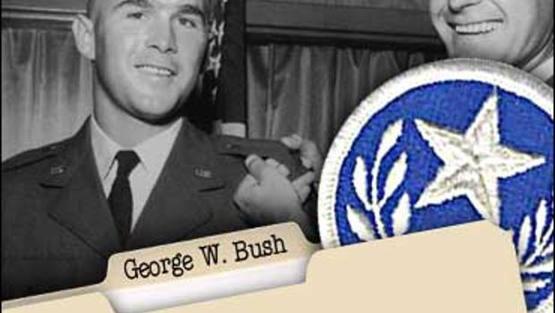On September 8, 2004, Dan Rather reported on 60 Minutes II about then-President George W. Bush’s service in the Texas National Guard during the Vietnam War. It was produced by Mary Mapes, who a few months previously had broken the Abu Ghraib story with Dana Roberson. The report was quickly attacked by bloggers, who questioned the authenticity of a series of documents known as the Killian documents and who focused on the spacing, fonts, and superscript. Rather and his team stood by the story, arguing that the bloggers and the media who picked up their critiques were deflecting away from the questions the reports asked. Rather’s team viewed the memos more as a piece of corroborative evidence and continued to believe in the veracity of the story—which was never questioned itself. CBS nevertheless asked Rather to apologize for the story on air, as the memos could not be authenticated and Bill Burkett, the man who had provided the memos, admitted to have misled CBS about the provenance of the documents.
Howard Kurtz summarized in the Washington Post the different reactions in the media to the story, concluding that "One thing is clear: The controversy over the '60 Minutes' documents has now overshadowed the questions they purport to raise about George W. Bush's military service." Although they disagreed about the story itself, Rather's fellow network anchors, Tom Brokaw and Peter Jennings, stood by their rival, arguing, in the words of Jennings, that "I don't think you ever judge a man by one event in his career." For some, Rather had been victim of his own hard-hitting style or, as the New Yorker called it, "competitiveness and scoopaholism." An article in the Columbia Journalism Review by Corey Pein detailed how the coverage of the story and its aftermath by the media was itself heavily flawed.
On November 24, 2004, Rather announced he would step down as anchor the following March 9, 2005, exactly 24 years after he succeeded Walter Cronkite in 1981.
CBS appointed a panel led by Republican Dick Thornburgh, former governor of Pennsylvania and United States Attorney General under George H. W. Bush, and Louis Boccardi, retired president and chief executive officer and former executive editor of the Associated Press. Released in January 5, 2005, their report concluded that CBS rushed to make inadequately verified allegations public and it was slow in responding to criticism. The panel, however, was unable to conclude whether the documents were forgeries or not, nor did it conclude that a political agenda at 60 Minutes Wednesday drove either the timing of the airing of the segment or its content. Like the story itself, the report and its conclusions were divisive. James C. Goodale review of the report in the New York Review of Books prompted a published exchange with Dick Thornburgh and Lou Boccardi. In the New Yorker, Ken Auletta wrote a long and comprehensive piece that summarized Dan Rather's career and the recent controversy.
CBS asked Senior Vice President Betsy West, who supervised CBS News primetime programs, 60 Minutes Wednesday Executive Producer Josh Howard, and Howard's deputy, Senior Broadcast Producer Mary Murphy to resign. The producer of the piece, Mary Mapes, was terminated. Dan Rather, who had announced he would retire as anchor in March 2005, continued working for 60 Minutes Wednesday until the show was canceled in May 2005. He then worked for 60 Minutes until he left CBS in June 2006, as his contract, contrary to what had been verbally agreed upon, was not renewed. In September 2007, he sued CBS for breach of contract and various tort theories, hoping that the discovery would shed light on what had really happened at CBS. The case was eventually dismissed, but Dan Rather had moved on to HDNet TV, now AXS TV. There he started a weekly news magazine, Dan Rather Reports, for which he was nominated for and won numerous awards.
Rather has stood by the story. In a 2007 interview with Larry King, Rather argued that the review panel was “a set-up,” and pointed to the fact that “nobody to this day has proved these documents were fraudulent. . . . The story was true.” The journalist also talked about the story in his 2012 memoir, Rather Outspoken: My Life in the News, and claimed that internal CBS documents that came to light during his lawsuit show how Viacom lobbyist Carol Melton, under pressure from GOP House Majority Whip Roy Blunt, urged Heyward to retract the Bush/TexANG story. In Rather's words, Melton "made it clear that Blunt was speaking for an even more powerful constituency—the White House.” Rather was especially critical of Leslie Moonves, who was then chairman and CEO of CBS, explaining that CBS should not have retracted the story "but that was the way that Blunt and the White House wanted it, and Moonves chose to oblige." His 2012 memoir led a new wave of articles that revisited the 60 Minutes II piece. Most of them, like the extensive Texas Monthly article in 2012, concluded that the story was and remained far more complex than expected.
In November 2005, producer Mary Mapes published a book about her career and the National Guard story and its aftermath. The book, Truth and Duty: The Press, the President, and the Privilege of Power, was turned into a film directed by James Vanderbilt and starring Robert Redford as Dan Rather and Cate Blanchett as Mary Mapes in 2015.


